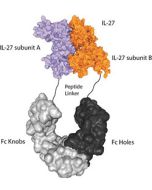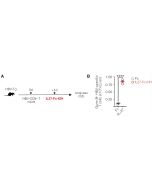Cookie Policy: This site uses cookies to improve your experience. You can find out more about our use of cookies in our Privacy Policy. By continuing to browse this site you agree to our use of cookies.
Chimerigen
IL-27 (mouse):Fc (human) (rec.)

| Product Details | |
|---|---|
| Synonyms | Interleukin-27 |
| Product Type | Protein |
| Properties | |
| Source/Host | CHO cells |
| Sequence |
The mouse IL-27 complex composed of the Ebi3 subunit (aa 1-228) and the p28 subunit (aa 29-234) is fused through a polypeptide linker to the Fc region of human IgG1. |
| Crossreactivity | Mouse |
| Biological Activity |
Bioactivity was measured in a cell proliferation assay of Con A activated mouse splenocytes. |
| Purity | ≥98% (SDS-PAGE) |
| Endotoxin Content | <0.001EU/μg protein (LAL test; Lonza). |
| Reconstitution | Reconstitute at 100μg/ml in sterile PBS. |
| Formulation | Lyophilized from 0.2μm-filtered solution in PBS. |
| Protein Negative Control | |
| Other Product Data |
NCBI reference NP_056581.1: Ebi3 subunit (mouse) |
| Declaration | Manufactured by Chimerigen. |
| Shipping and Handling | |
| Shipping | BLUE ICE |
| Short Term Storage | +4°C |
| Long Term Storage | -20°C |
| Handling Advice |
Avoid freeze/thaw cycles. Centrifuge lyophilized vial before opening and reconstitution. |
| Use/Stability |
Stable for at least 1 year after receipt when stored at -20°C. Working aliquots are stable for up to 3 months when stored at -20°C. |
| Documents | |
| Product Specification Sheet | |
| Datasheet |
 Download PDF Download PDF |
Interleukin-27 (IL-27) is a heterodimeric group 2 receptor ligand molecule that belongs to the IL-6/IL-12 family of long type I cytokines. It is composed of EBI3 (EBV-induced gene 3), a 34 kDa glycoprotein that is related to the p40 subunit of IL-12 and IL-23, and p28, the cloned 28 kDa glycoprotein that is related to the p35 chain of IL-12. IL-27 is expressed by monocytes, endothelial cells and dendritic cells. IL-27 binds to and signals through a heterodimeric receptor complex composed of WSX1 (TCCR) and gp130. Evidence suggests IL-27 interacts only with WSX-1. IL-27 has both anti- and proinflammatory properties. As an antiinflammatory, IL-27 seems to induce a general negative feedback program that limits T and NK-T cell activity. At the onset of infection, IL-27 induces an IL-12 receptor on naïe CD4+ T cells, making them susceptible to subsequent IL-12 activity (and possible Th1 development). Notably, IL-12 family cytokines are both induced and inhibited by bacterial products. Microbes promote IL-27 secretion through TLR4, and also block IL-27 production via C5a induction.








